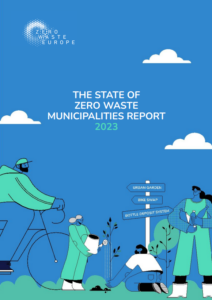9 tips for a zero waste lockdown
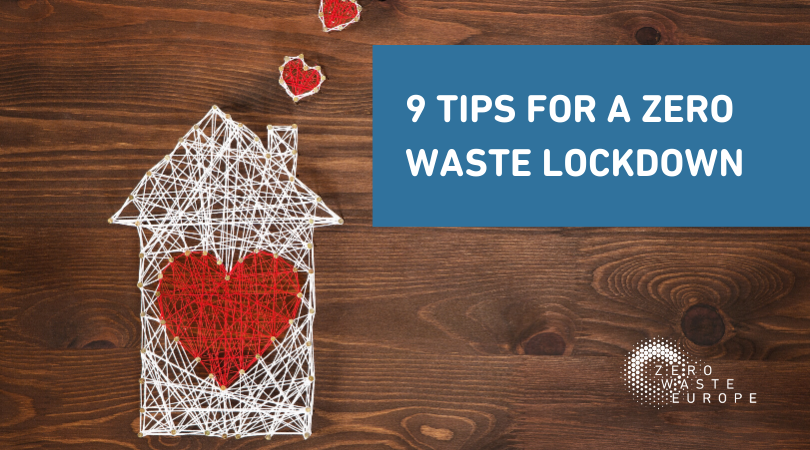
It is a fact that this pandemic has turned our lives upside down. The impacts that the COVID-19 virus is bringing to people, society, businesses, and public health systems are devastating. These are undeniably challenging times for everyone. But at the same time, it is beautiful to see the sense of community and solidarity growing, and people showing support to one another across the world.
The ‘physical’ distance does not mean that socially we have to disconnect from one another (but rather the opposite). The statement that ‘we are stronger together’ has never made so much sense. In times like these, we need to care for each other and our world more than ever. With this in mind, and thinking about individuals, our community and our planet, we have prepared a few tips that could inspire those that want to take the opportunity to rethink their lifestyle and habits to pass through this moment in an ‘environmentally friendly way’:
1.Plan your meals ahead
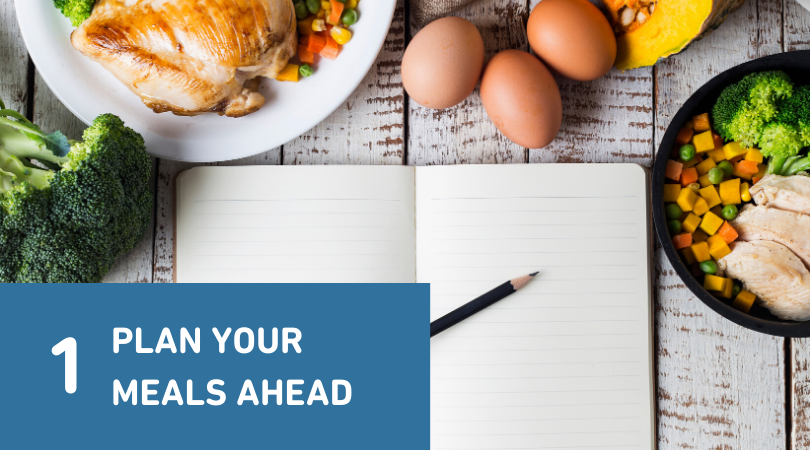 With many restaurants closed and demands for people to stay at home, we will consequently be cooking more – which is great (for some)! Nevertheless, an important exercise to do before going shopping for food is to plan ahead your meals for the week(s) to come. This will not only help you ensure you are buying sufficient food for the period but also to ensure nothing is wasted. Don’t forget that many perishable goods, such as fruits and vegetables can be frozen! This exercise can also be an excellent opportunity to boost your creativity in the kitchen, by learning how to cook with food surpluses and using everything that’s about to expire. Therefore, planning your meals before going shopping could be a great exercise to prevent food waste while improving your organisational and cooking skills!
With many restaurants closed and demands for people to stay at home, we will consequently be cooking more – which is great (for some)! Nevertheless, an important exercise to do before going shopping for food is to plan ahead your meals for the week(s) to come. This will not only help you ensure you are buying sufficient food for the period but also to ensure nothing is wasted. Don’t forget that many perishable goods, such as fruits and vegetables can be frozen! This exercise can also be an excellent opportunity to boost your creativity in the kitchen, by learning how to cook with food surpluses and using everything that’s about to expire. Therefore, planning your meals before going shopping could be a great exercise to prevent food waste while improving your organisational and cooking skills!
2. Start composting (if you haven’t yet)
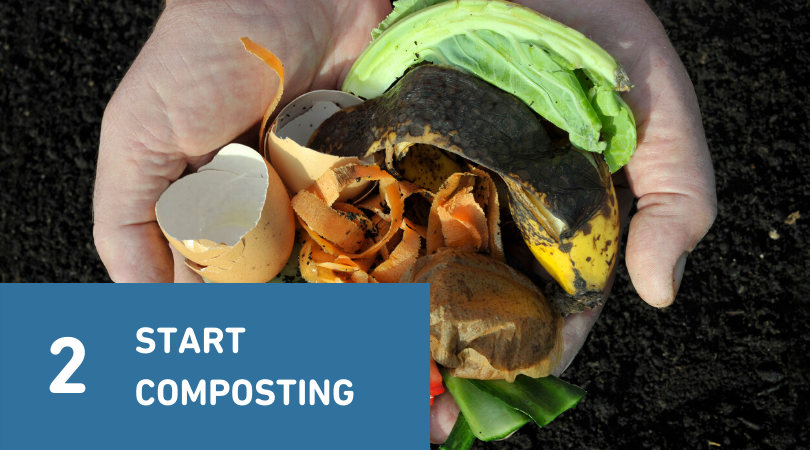 You may have already noticed that as a consequence of staying home and cooking more, your organic waste has also increased. Organic waste is often one of the most challenging waste streams in urban areas, as it’s usually the largest source of household waste. Composting organic waste has many benefits for the environment, not only by returning the nutrients to the soil and lower greenhouse gas emissions, but also by avoiding hazardous disposal systems such as landfilling and incineration (to know more about composting benefits check our blog post here.) Therefore, while you are at home, think about composting your organic waste, even if you don’t have a garden, there are other alternatives such as worm bins and community composting sites.
You may have already noticed that as a consequence of staying home and cooking more, your organic waste has also increased. Organic waste is often one of the most challenging waste streams in urban areas, as it’s usually the largest source of household waste. Composting organic waste has many benefits for the environment, not only by returning the nutrients to the soil and lower greenhouse gas emissions, but also by avoiding hazardous disposal systems such as landfilling and incineration (to know more about composting benefits check our blog post here.) Therefore, while you are at home, think about composting your organic waste, even if you don’t have a garden, there are other alternatives such as worm bins and community composting sites.
3. Support your community (e.g: local food suppliers)
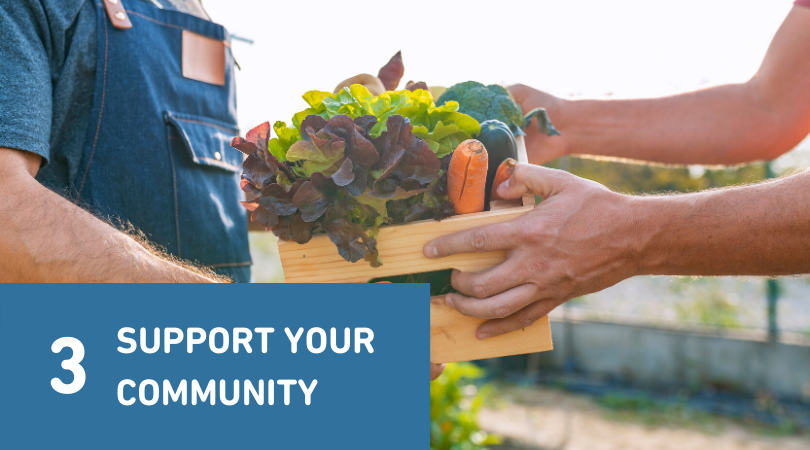 Local businesses are essential for our communities, for the sustainability of our planet (most of them are based on short supply chains with reduced carbon footprints), as well as for job growth and for creating entrepreneurship opportunities. In times of crisis, we will inevitably see many of these local businesses suffering as they generally don’t have the cash reserves to sustain themselves. Therefore, if you need to buy something, try to do it locally first!
Local businesses are essential for our communities, for the sustainability of our planet (most of them are based on short supply chains with reduced carbon footprints), as well as for job growth and for creating entrepreneurship opportunities. In times of crisis, we will inevitably see many of these local businesses suffering as they generally don’t have the cash reserves to sustain themselves. Therefore, if you need to buy something, try to do it locally first!
4. Eat well!
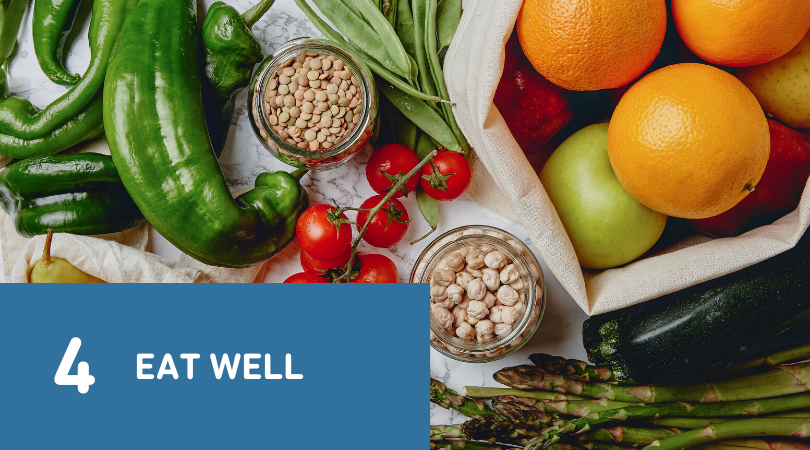 In moments like this, taking care of our health and immune system is crucial for keeping us strong and healthy! Focusing on having a healthy diet and eating well, by using what nature offers you: vegetables, fruits and grains! Most fruits and vegetables are available in bulk or unpacked, including at many big supermarket chains, so you can boost your immune system while reducing your plastic and packaging footprint. Remember that most vegetables and fruits can be also be frozen, so you can plan accordingly to avoid food waste (ps: don’t forget to read our tips 1 & 2 to plan ahead your meals and compost the organic matter ;-))
In moments like this, taking care of our health and immune system is crucial for keeping us strong and healthy! Focusing on having a healthy diet and eating well, by using what nature offers you: vegetables, fruits and grains! Most fruits and vegetables are available in bulk or unpacked, including at many big supermarket chains, so you can boost your immune system while reducing your plastic and packaging footprint. Remember that most vegetables and fruits can be also be frozen, so you can plan accordingly to avoid food waste (ps: don’t forget to read our tips 1 & 2 to plan ahead your meals and compost the organic matter ;-))
5. Get the waste sorting right
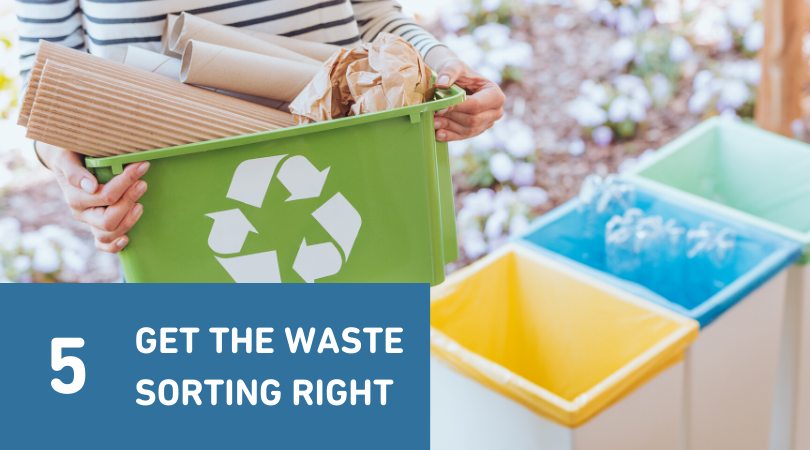 As you might know, people working in the waste sector (waste workers) are included in the essential jobs that cannot stop during this period and put themselves at risk every day dealing with everyone’s waste (read more here). Therefore, as citizens, the least we can do to minimise the impacts of the pandemic on their lives is to focus our efforts in sorting our waste correctly. According to the EC’s guidance on waste management in the context of the coronavirus crisis:
As you might know, people working in the waste sector (waste workers) are included in the essential jobs that cannot stop during this period and put themselves at risk every day dealing with everyone’s waste (read more here). Therefore, as citizens, the least we can do to minimise the impacts of the pandemic on their lives is to focus our efforts in sorting our waste correctly. According to the EC’s guidance on waste management in the context of the coronavirus crisis:
‘in the context of the coronavirus crisis, it is even more important that citizens separate their waste well and ensure the flow of clean streams of recyclables towards the waste treatment facilities’.
Also, keep in mind that your municipality may establish some temporary disruptions in the collection, especially of waste that require specific care, including WEEE (Waste Electrical and Electronic Equipment), batteries or household chemicals (which should not go to the residual bin). Thereby, keep informed about the recommendations of your municipality regarding waste collection. Of course, the general recommendation is to reduce waste at home where possible and make sure it is well sorted (recyclables, etc.). In this way, we help to protect the waste workers and facilitate their work in such difficult periods.
6. Declutter your house
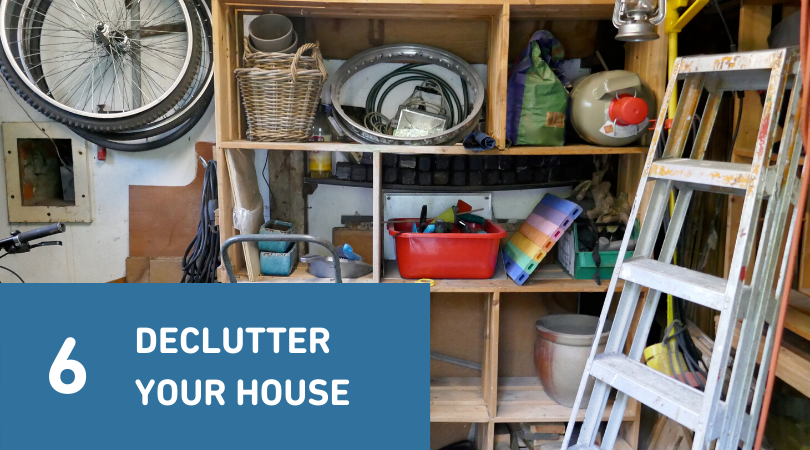 Being locked down at home seems like the perfect opportunity to organise the space you live (and currently may also work) in, doesn’t it? This exercise can help you improve your home (and work) environment and well-being. While you review your things at home, also rethink what could have another role or be reused instead of given away. You may be surprised at how you can save money, time and space by just shifting things around! When you finish your decluttering process simply store unwanted sorted items in a given space, as most of the places where we can give our things to be reused or recycled are currently closed. Do not throw them away!
Being locked down at home seems like the perfect opportunity to organise the space you live (and currently may also work) in, doesn’t it? This exercise can help you improve your home (and work) environment and well-being. While you review your things at home, also rethink what could have another role or be reused instead of given away. You may be surprised at how you can save money, time and space by just shifting things around! When you finish your decluttering process simply store unwanted sorted items in a given space, as most of the places where we can give our things to be reused or recycled are currently closed. Do not throw them away!
7. DIY – Do It Yourself
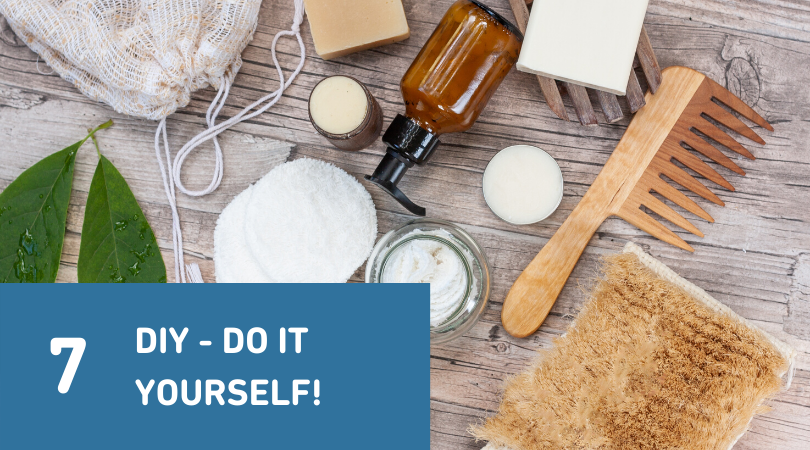 With many shops closed, instead of turning to e-commerce and being drowned by tons of packaging, what about putting your creativity to the test and trying to do things yourself? For instance, have you run out of your face mask, moisturiser, hand/body cream, deodorant, shampoo, or other cosmetics? There are plenty of natural and amazing cosmetics that you can make yourself at home with simple ingredients (some inspiration here and here)! The same applies to household products. For instance, do you know you can make an all-purpose house cleaner with only 3 simple ingredients? When it comes to food, the ‘DIY’ world is limitless – even the seeds from your pumpkin that you may have thought to throw away can be turned into delicious and healthy milk (read how here).
With many shops closed, instead of turning to e-commerce and being drowned by tons of packaging, what about putting your creativity to the test and trying to do things yourself? For instance, have you run out of your face mask, moisturiser, hand/body cream, deodorant, shampoo, or other cosmetics? There are plenty of natural and amazing cosmetics that you can make yourself at home with simple ingredients (some inspiration here and here)! The same applies to household products. For instance, do you know you can make an all-purpose house cleaner with only 3 simple ingredients? When it comes to food, the ‘DIY’ world is limitless – even the seeds from your pumpkin that you may have thought to throw away can be turned into delicious and healthy milk (read how here).
Discover the beauty and pleasure of making your own products with love while avoiding waste, boosting your health and creativity!
8. Give a try to reusable hygiene items
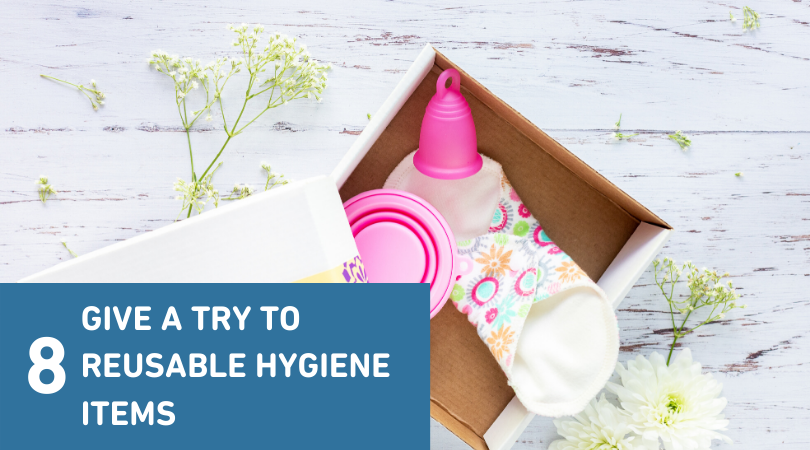 Menstrual products and nappies are essential items that menstruators and families cannot live without. If you are included in this category, instead of running to the shops and piling up disposable ones in your wardrobe (which will quickly turn into a waste pile), this may be THE opportunity you were waiting for to try out that cool reusable panty or reusable nappy! Apart from having many environmental benefits (waste reduction and less resource-intensive), these reusable products can be translated into high economic savings for consumers.
Menstrual products and nappies are essential items that menstruators and families cannot live without. If you are included in this category, instead of running to the shops and piling up disposable ones in your wardrobe (which will quickly turn into a waste pile), this may be THE opportunity you were waiting for to try out that cool reusable panty or reusable nappy! Apart from having many environmental benefits (waste reduction and less resource-intensive), these reusable products can be translated into high economic savings for consumers.
According to a recent study the savings can range between €200 and €2,000 (for reusable nappies) and more than €4,400 (for reusable menstrual products) in a lifetime compared to disposable ones. The same study also reveals the nasty facts about the use of hazardous chemicals in conventional disposable nappies (which can enter into contact with babies’ skin), as well as in conventional disposable menstrual products, such as endocrine-disrupting substances (linked to heart diseases, infertility and cancer). The same logic applies to reusable cleaning cloths, which are much more sustainable and cost-efficient than disposable wet-wipes. Recent news has shown that many consumers are going for reusables in the midst of the lockdown. Let’s embrace this positive lifestyle shift and finally break free from those nasty plastic-made disposable products!
9. Take care of yourself and others
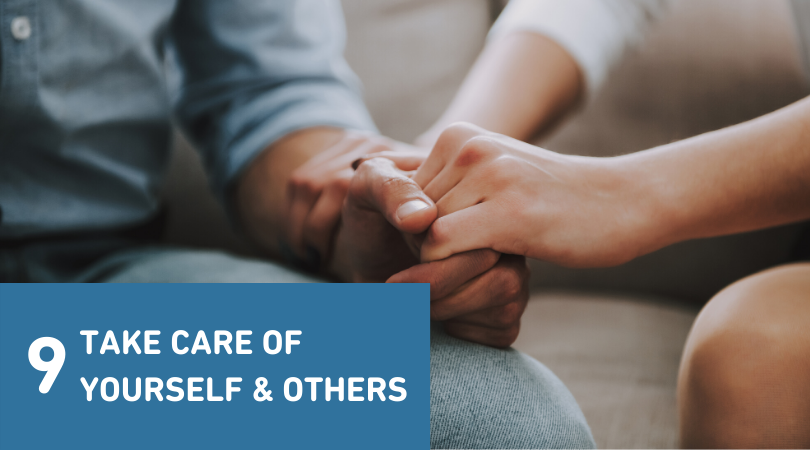 Last but not least. Keeping dirt away from our mind and spirit is as important as preventing waste from entering our homes. Take care of your well-being as our thoughts and emotions are crucial to having a healthy life! Social distance requires only physical restrictions, but it does not mean disconnecting from others. We are in this together and we’ll get through this as a community as well. Let’s support and take care of one another, sharing positivity, kind words and love.
Last but not least. Keeping dirt away from our mind and spirit is as important as preventing waste from entering our homes. Take care of your well-being as our thoughts and emotions are crucial to having a healthy life! Social distance requires only physical restrictions, but it does not mean disconnecting from others. We are in this together and we’ll get through this as a community as well. Let’s support and take care of one another, sharing positivity, kind words and love.
One thing is certain – this pandemic will pass (hopefully soon), but the lessons learned – about our own selves, our lives, habits, society, community and the world as a whole – should be kept, and the understanding of collective support should never be underestimated.
Stay safe and take care of each other.
Disclaimer: The quarantine and lockdown restrictions may bring up mixed emotions and ‘ups and downs moments’ to all of us, which are fairly comprehensive. Therefore, no one should feel pressured or guilty about not following any of these tips. Respecting your time, your feelings and your health should be the main priority. Do what you can, with what you have.
